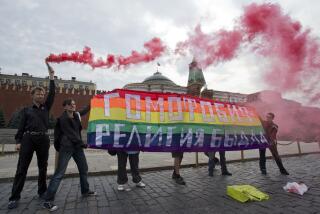Soviet Plan for Minorities: Debate Along With Curbs
- Share via
MOSCOW — The Soviet leadership Thursday proposed “radical transformations” in the Kremlin’s dealings with that nation’s 15 republics and suggested that ethnic minorities who oppose Soviet laws be permitted to “question” them before a high court.
But at the same time, the country’s leaders, in a sweeping policy statement, sought to put general limits on how far activists can go in pressing for minority rights. It suggested a new law banning “nationalist and chauvinist organizations,” an apparent reference to groups organized in many of the republics to agitate for change.
The Communist Party statement offered few concrete suggestions on how to deal with the increasingly acute problem of ethnic strife, which has resulted in the deaths of about 200 people over the last 18 months.
Instead, the intent of the document, printed on 1 1/2 pages in Pravda, the Communist Party newspaper, appeared to be to create an atmosphere of compromise so that the issue of ethnic relations can be calmly discussed at a plenary session of the party’s Central Committee that is expected to be held next month. Suggestions contained in the document will be considered then.
However, unless practical proposals are raised and approved at that plenum, one Western analyst warned Thursday, new and more serious unrest is likely because it will appear to minority groups as though the long-dominant Russian majority is willing to talk about their rights--but not to act.
President Mikhail S. Gorbachev has said that the problem of interethnic hostility threatens the very existence of his federation of 286 million people.
But previous efforts by Gorbachev to soothe tempers and end ethnic protests--including the sending of Red Army troops to trouble spots and appealing to the nation personally on nationwide television--have failed to prevent trouble from cropping up in many of that nation’s republics.
Over the last year, minority groups have agitated for freedoms ranging from the right to fly nationalist flags to the right to split from the nation and form independent states.
In one of the most significant concessions to date, the Kremlin granted a measure of economic autonomy to the Baltic states of Lithuania, Latvia and Estonia. They are among the most embittered over central control imposed by Moscow and among the most active in pursuing ethnic rights.
The Communist Party document released Thursday said rights given to republics so far should be expanded, and it noted that the party seeks to guarantee “free development of the spiritual life of all peoples of the Soviet Union.”
In the past, it said, “independence of republics was curtailed under the pretext of the protection of the interests of the whole state.”
“Now that Soviet society has embarked on major radical reforms, we need to ensure free national development, enhance the interethnic unity of society and consolidate our multi-ethnic Soviet state,” the document said.
In a decisive break with the past, the statement dismissed the long-held Bolshevik goal of blurring ethnic distinctions to create a new “Soviet man.” Instead, it argued that the uniqueness of each culture should be valued.
“The Soviet Communist Party proceeds from the recognition of the originality of national cultures, their unique value. . . . Harmonizing inter-ethnic relations on a new basis is one of the supreme goals of the Communist Party’s nationalities policy,” the statement said. It added that it is time for “radical transformations in the Soviet federation.”
The document proposed that republics be permitted to “raise the question” of rejecting national laws that they believe exceed the authority of the central government. The contested laws then would be considered by the Constitutional Control Commission, a new high court created last year.
In return, it said, the central government would have the power to cancel unconstitutional laws passed in republics.
The statement, although adhering to mild language, also warned: “The heightening of national awareness should be distinguished from nationalism.”
“A citizen of the republic is simultaneously a citizen of the Soviet Union,” it said in what appeared to be a warning to activists in Georgia and the Baltic states who have demanded outright secession from the nation.
“Giving privileges to some people and limiting the rights of others for reasons of nationality, religion, language or duration of residence is impermissible,” the document added.
The latter was a clear reference to recent conflicts in Estonia, where the ethnic Russian minority has been striking for more than a week to protest a law passed by the republic’s legislature limiting the voting rights of newly settled immigrants. Many of the Russians in Estonia are newcomers.
On Wednesday, the Presidium of the Supreme Soviet--the executive body of the Soviet national legislature--declared the Estonian residence requirement unconstitutional, and the Estonian Parliament agreed to reconvene by Oct. 1 to reconsider the law.
Also on Wednesday, ethnic Russians in Moldavia staged a two-hour “warning strike” to protest a bill that would make Moldavian the official language in the southwestern Soviet republic. A similar law already is in place in Estonia.
The Communist Party policy statement, while not referring to any specific area of conflict, urged in general that minorities seeking to expand their rights demonstrate tolerance and patience.
“Soviet citizens should feel at home in any area of the country,” the policy statement read. “Such is the supreme and final goal of all work to harmonize inter-ethnic relations.”
More to Read
Sign up for Essential California
The most important California stories and recommendations in your inbox every morning.
You may occasionally receive promotional content from the Los Angeles Times.










